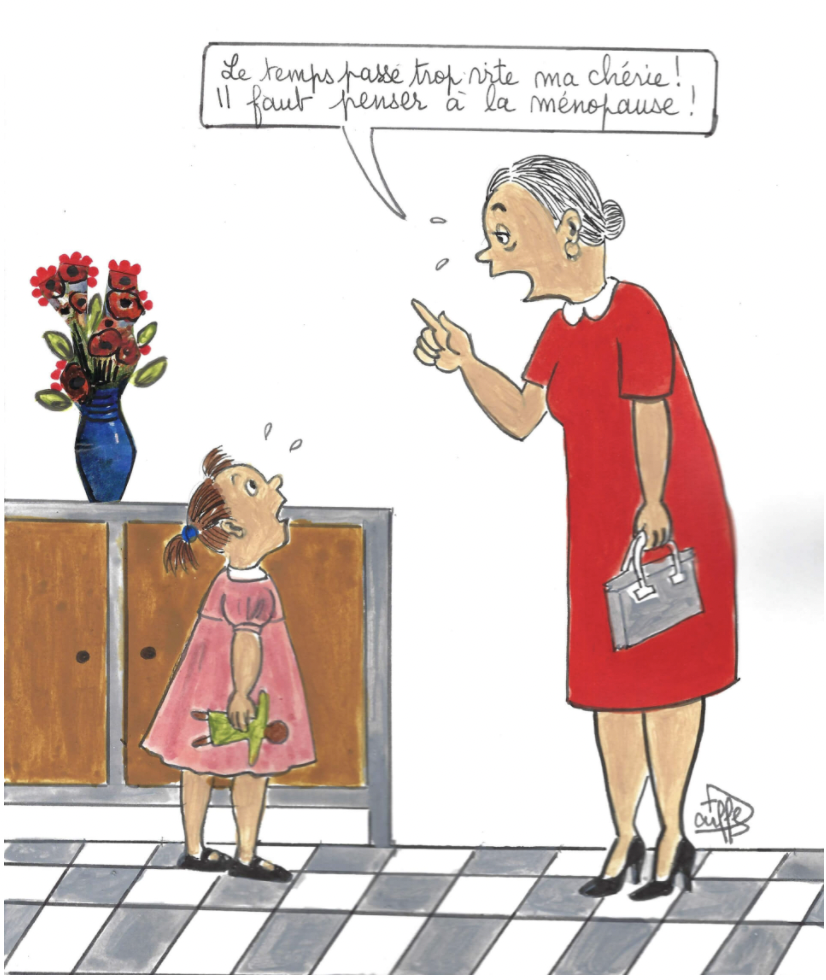This post is also available in: Français (French)
Our white hair looks like sardines, orcas are our sisters, trans are good hormone advisors and everything comes together in a rock opera to the tunes of Dao or Rita Misouko… “Menopause for all” is a radio documentary series composed of 4 episodes, produced by Perrine Kervan and directed by Annabelle Brouard.
Broadcast last March on France culture, the 4 episodes denounce the invisibility that slyly envelops women as they approach their fifties and grasp what menopause is, cheerfully, intimately, poetically, politically, socially, historically, anthropologically, and scientifically. Menopause, or rather, menopauses as beyond the metronome of the biological clock, take multiple forms. These episodes invite us to discover different feelings and various experiences.

Coordinating producer of the LSD program at France Culture, Perrine Kervan, had been carrying this gem within her for a long time.
“The idea of making a documentary on menopause came to my mind about ten years ago on the occasion of the fiftieth anniversary of France Culture,” she explains.
“By analogy with our fifty-year-old radio, together with Maryvonne Abolivier, we had imagined a fiction on the fifty-year-old woman. Being passionate about the subject, we got caught up in the game. At the time, no one was talking about menopause. I realized that I had never even brought up the subject with my mother. The reactions to this proposal were frankly negative: “How horrible! Menopause is not sexy!” we were told.”
At then, both women gave up. Nevertheless, the tenacious idea of the producer was accepted later. “As soon as I had the freedom to do it, I came back to the initial project. Times have changed. I realized this while doing a series on periods which was very successful.”

Invisibility
Times have certainly changed but, in most people’s mentalities, menopause is still decked out in its creepy tinsel. “We had been told so much that this subject was boring that when I looked for what could be the most glamorous possible way to address it, I told myself: “But of course, the musical is the sexier way! This is how the idea of telling the menopause with operatic incursions was born.”
Aged 45, Perrine Kervran, who lent her voice to introduce the series, in an offbeat tone, mocks her own fear of menopause. In a hilarious litany, she lists the conflicting symptoms and injunctions that women experience as they approach menopause. Fatigue, memory loss, the doubt about wearing grey or dyed hair, being appealing or not anymore. The list is long.
A range of existential tingles in contrast to this invisibility suffered by the menopausal woman, a neutral silence that suddenly erases her from the social and seductive scene.
“In European cinema, 75% of characters over 50 are men. We still should wonder why there are no women over 50 on our screens?” asks author Iris Brey. In real life it’s not better. “I realized that the men who still looked at me were men of my age and older. No younger man looked at me at all. While I know very well that a 50 year-old man continues to be looked at by women of almost all ages,” notes philosopher Camille Froidevaux-Metterie.
“You who look at me, monitor me: we are before being perceived. Our language speaks a raw language, of flesh, body and flow…” Words used by the Hot Bodies Choir.
Menopause Tralala
It was out of the question to sink into gloom. The idea of the opera followed its path. The Hot Bodies feminist choir answered the call. Composed of feminist and queer activists who combine collective reading and writing with choral singing, the choir took on the project with great enthusiasm. It was needed.
At the time of the recording, the lockdown surprised everyone. Due to barrier gestures, it was impossible to bring together the choir members to sing.
“We tried to think of an alternative, and we thought that rather than a real choir, it was smarter to use quotes of women talking about their menopause and enhance them by adding a background music corresponding to the hits they used to listen you when they were 15 years old. The women of the Hot Bodies responded straight away. Firstly, we sent them the texts by WhatsApp, and they practiced until we managed to get bring them together to sing in small groups in the open air at the Parc de la Vilette and elsewhere.”
The idea is brilliant, and the energy of the Hot Bodies Choir is fertile. The stories told by women make up the libretto of this funny opera, which intersects the 55 radio minutes of episode 1. The words of these women thus find a new youth. This chain of vocal sorority brings them out of their shadows and enables to represent them in this particular moment of their life.
“The 45-year-old woman is as if she were a little dull, a little not there, a little invisible…” Words used by the Hot Bodies Choir.

“What was important”, adds Perrine Kervran, “is to hear all kinds of women talk about their menopause, women of all origins, coming from all social backgrounds. If we had only listened to fifty-year-old middle-class women, we would have missed what we wished to do. That’s why we went to the ‘Maison des femmes’ in Montreuil and to the Francs Moisins Centre of Saint-Denis, a precious place when women come regularly and speak confidently. We were under lockdown but as soon as it was possible, with open windows and masks on our noses, we were able to collect their testimonies.”
What do Sonja, Carole, Isabelle, Maria, Zara, Khadija, Juliette, Leocadie, Asta, Gwenaelle and Gisèle tell us? The way in which they experienced this moment in their bodies and in their minds, sometimes without being aware: the overflowing emotion, the easy tears, the hot flushes that invade them or that they try to tame, loss of libido or the discovery of a different sexuality, the anxiety of finitude or, conversely, the feeling of being in a turning point that opens onto other horizons. One of them has had a small portable fan made by her husband, the other has taken her husband with her to the doctor to make him better understand why she had less sexual desire. In a chirp of complicity intersperses with laughter, they tell their stories, each naming the phenomenon in their own culture: “Sinn al ya’s” (menopause in Arabic), “she is of age” or “you no longer see your period”, some still say in some sub-Saharan African countries to designate the postmenopausal woman
“If I could have found a pool and dive in it, I would have done it, I couldn’t stand my clothes on anymore…” Words used by the Hot Bodies Choir in the song “Porque te vas”.
OrCasm
In the grip of her first hot flashes, the American author Darcey Steinke conducted research and discovered that women and orcas are on the only two species that experience menopause. Gradually, cetaceans took an increasingly important place in her life. She saw them in her dreams, in the lake where she bathes, even in her bowl of soup.
“After menopause, female orcas become leaders of their community,” she notes, “they are the ones who know where to find fish, they help with the formation of couples where they take care of the youngest. It was the first description of menopause that really helped me accept the idea. I realized it could be a form of empowerment.”
Since the dawn of time, postmenopausal women have perfectly embodied “care”, by making themselves available to their community. Paradoxically, by helping others, postmenopausal women who are no longer fertile, allow the youngest to be and the species to reproduce. “This story of the orca is brilliant,” exclaims Perrine Kervran. “Darcey Steinke is a very nice woman who recounts with a lot of humor, her encounter with this hundred-year-old orca like a trance, an epiphany, an orcasm.”

Yet, generally, there is no metaphor, digression, or levity in the representations of menopause, which continues to be referred to as a pitfall. The woman loses her youth, her beauty and her fertility. She loses everything, which is why she is summoned to preserve these characteristics.
The major American laboratories have made a big fuss of it by manufacturing substitute hormones, relayed by a medical practice that treats menopause as a debilitating pathology.
“In contemporary French society” writes sociologist Cécile Charlap, “menopause is a key stage in the aging of women, often experienced with anguish, and taken care of by medicine. One would think that this is a universal way of looking at an event that, after all, is also universal. This is not the case. Depending on societies, the cessation of menstruation can be an increase in possibilities and powers, the advent of a sexuality finally freed from fertility, or even a non-event, not being the subject of particular attention, very much so that there is no word to designate it.”
Men and hormones
Are we the only ones subject to hormonal whims? Far from it. Men too have cycles, surges of testosterone controlled by a seasonal hypothalamus. They also experience a kind of menopause: feeling down, becoming overweight, low libido, hot flashes. “In fact, there are many common symptoms between men and women around the age of fifty, but while for women we do a whole lot of them, we don’t talk about those affecting men,” notes Perrine Kervran. “And yet, poor them, it is very difficult for them too since they undergo a continual injunction to perform.”
“Andropause ton gun”, the title of episode 3 precisely diverts, with irony, this injunction to performance for an invitation made to men - perhaps just as painful - to let go and put their ills into words: “Talking about it is a real taboo, even worse than a taboo, it’s a sort of death”, stresses the producer.
“Besides, no man wanted to talk about his andropause. In order to collect testimonies, we had to put it differently, referring to “the midlife crisis”. Talking about what happens to them when they reach their fifties is possible, pronouncing the word “andropause” remains very complicated as it designates a pathology that men fail to recognize.”

Elise Thiebaut adds, “We constantly tell a woman who is in a bad mood that she has her ragnagna. But when a man is angry, no one would even think to tell him he might be having a little testosterone spike.”
There would still be a lot to say about this radio work, which distils a beautiful energy to the talk about an age where we were supposed to have less.
“What was very nice about this project is that as soon as we approached someone, the person got involved with a lot of enthusiasm, generosity and availability. People were very happy to talk about something other than covid,” concludes Perrine Kervran.
A 10-year-long gestation, snippets of life torn from the fright of lockdown, these “hot flashes of time” undoubtedly participated in the creative alchemy of this unprecedented series, to be listened to, savored and re-listened to.


























